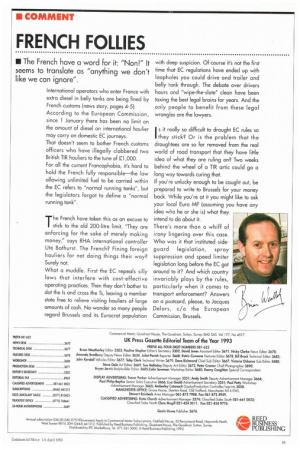• The French have a word for it: "Non!" It
Page 18

If you've noticed an error in this article please click here to report it so we can fix it.
seems to translate as "anything we don't like we can ignore".
International operators who enter France with extra diesel in belly tanks are being fined by French customs (news story, pages 4-5). According to the European Commission, since 1 January there has been no limit on the amount of diesel an international haulier may carry on domestic EC journeys.
That doesn't seem to bother French customs officers who have illegally clobbered two British TIR hauliers to the tune of £1,000.
For all the current Francophobia, it's hard to hold the French fully responsible—the law allowing unlimited fuel to be carried within the EC refers to "normal running tanks", but the legislators forgot to define a "normal running tank".
The French have taken this as an excuse to stick to the old 200-litre limit. "They are enforcing for the sake of merely making money," says RHA international controller Ute Bathurst. The French? Fining foreign hauliers for not doing things their way? Surely not.
What a muddle. First the EC repeals silly laws that interfere with cost-effective operating practices. Then they don't bother to dot the Is and cross the Ts, leaving a member state free to relieve visiting hauliers of large amounts of cash. No wonder so many people regard Brussels and its Eurocrat population with deep suspicion. Of course it's not the first time that EC regulations have ended up with loopholes you could drive and trailer and belly tank through. The debate over drivers hours and "wipe-the-slate" clean have been taxing the best legal brains for years. And the only people to benefit from these legal wrangles are the lawyers.
s it really so difficult to draught EC rules so they stick? Or is the problem that the draughtees are so far removed from the real world of road transport that they have little idea of what they are ruling on? Two weeks behind the wheel of a TIR artic could go a long way towards curing that.
If you're unlucky enough to be caught out, be prepared to write to Brussels for your money back. While you're at it you might like to ask your local Euro MP (assuming you have any idea who he or she is) what they intend to do about it.
There's more than a whiff of irony lingering over this case. Who was it that instituted side guard legislation, spray suppression and speed limiter legislation long before the EC got around to it? And which country invariably plays by the rules, particularly when it comes to transport enforcement? Answers on a postcard, please, to Jacques Delors, c/o the European Commission, Brussels.




















































































